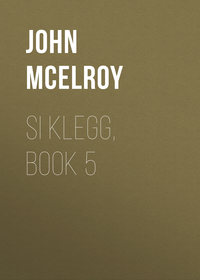 полная версия
полная версияSi Klegg, Book 6
"Further admonitions," continued the Lieutenant, "had the same result, and I was about to call a guard to put him under arrest, when I happened to notice a pair of field-glasses that the prisoner had picked up, and was evidently intending to appropriate to his own use, and not account for them. This was confirmed by his approaching me in a menacing manner, insolently demanding their return, and threatening me in a loud voice if I did not give them up, which I properly refused to do, and ordered a Sergeant who had come up to seize and buck-and-gag him. The Sergeant, against whom I shall appear later, did not obey my orders, but seemed to abet his companion's gross insubordination. The scene finally culminated, in the presence of a number of enlisted men, in the prisoner's wrenching the field-glasses away from me by main force, and would have struck me had not the Sergeant prevented this. It was such an act as in any other army in the world would have subjected the offender to instant execution. It was only possible in—"
"Pardon me, Lieutenant—I should perhaps say Captain"—interrupted Lieut. Bowersox, with much sweetness of manner, "but the most of us are familiar with your views as to the inferiority of the discipline of the Western Armies to that of the Army of the Potomac and European armies, so that we need not take up the' time of the court with its reiteration. What farther happened?"
"Nothing. The Provost Guard came up at that moment, and I directed a Sergeant to place the two principal offenders in custody, and secure the names of the witnesses."
"Is that all, Captain?"
"Yes, except that in closing my testimony I feel that it is my duty to impress upon the court that so flagrant a case as this should be made the opportunity for an example in the interests of discipline in the whole army. I have known this prisoner for some time, and watched him. This is not the first time that he and the Sergeant have insulted me. They are leaders in that class of uneducated fellows who have entirely too little respect for officers and gentlemen. They should be taught a lesson. This is necessary for the dignity and effectiveness of gentlemen who bear commissions, and—"
"I will ask the witness if this lecture on military ethics is a part of his testimony?" asked the Major:
"I think it is needed," answered the Lieutenant tartly.
"Let me see, Steigermeyer," said the Major, adjusting another chew of tobacco to his mouth, and balancing the knife with which he had cut it off, judicially in his fingers, a favorite position of his when, as a lawyer, he was putting a witness through a cross-examination. "How long have you been with this army? Came West with the Eleventh Corps, didn't you?"
"No; I was left behind on duty. I didn't come for several weeks after."
"So I thought. You weren't with us at Stone River, or Chickamauga, or Mission Ridge. You'd know more if you had been. Your mental horizon would have been enlarged, so to speak. Aren't you from Milwaukee?"
"I was born and brought up there, until I went to West Point," answered the Lieutenant, rather uneasily.
"So I thought. The only man of your name that I ever heard of kept a saloon in Milwaukee—a great place for politicians to hang around. I used to go there myself when I was in politics. He was a sort of a ward boss. Was he your father?"
"Yes, sir," said the Lieutenant, with reddening face; "but I don't know what this has to do with the case that I have presented to your attention."
"It has a great deal to do with this lecture with which you have favored us," answered the Major dryly. "But we'll not discuss that in open court. Are you through with the witness, Judge-Advocate? If so, call the next."
"I'll just ask the Captain a few questions for the defense," said Lieut. Bowersox. "How did you know that the prisoner was drunk?"
"How did I know it? How does any man know that another is drunk? He was boisterous, excited and yelling—that kind of a drunk."
"But that does not prove that he was drunk. That may be his way of doing his work. Did you see him drink?"
"No."
"Did you ever see him before?"
"Yes."
"How was he acting then?"
"I shall have to say that he was boisterous and yelling then, but not so wildly excited."
"Then it was only a difference in degree, not kind. Was he not accomplishing what he was ordered to do?"
"Yes, he certainly did bring that limber out of the gulch."
"Then it is only a matter of opinion that he was drunk. You have nothing to guide you except your judgment that the man was drunk, who was still doing his duty pretty effectively."
"But there could be no mistake. I know that the man was raging drunk."
"As I said before, that is a matter of opinion and judgment which I will discuss with the court later. Did the prisoner actually strike you?"
"I cannot say that he actually did, farther than snatch out of my hand the field-glasses."
"He didn't do it! You're lyin'! I yanked the glasses out of your hand. 'Twas me," shouted little Pete, from the oak leaves.
The members all looked up in astonishment.
"Sergeant," said the Major to the Sergeant of the Provost Guard, "fetch that little rascal down and buck-an-gag him, until I can decide what further punishment he deserves for eavesdropping, and interrupting the court."
"I don't care if you kill me," whimpered little Pete, as they tied his hands together, "if you'll only let Corp'l Elliott off. He wasn't to blame. It was me.
"You can go," said Lieut. Bowersox to the Lieutenant. "Sergeant, bring in Orderly-Sergeant Jacob Whitelaw."
In response to the Judge-Advocate's direct questionings the Orderly-Sergeant had to sorrowfully admit that he thought that Shorty was drunk, very drunk, and exceedingly noisy. But when Lieut. Bowersox changed to the defense, the Orderly-Sergeant testified with great alacrity that he had not seen Shorty take a drink, that he did not know where he could have got whisky; did not know where in all that part of Georgia there was a drop of liquor outside of the Surgeon's stores and the officers' canteens; that he wished he did know, for he'd like to have a drink himself; and that Shorty, when he was putting forth his greatest strength, was generally very vociferous and not at all careful of what he said. This was one of the peculiarities of the man, that he was overlooked on account of his great effectiveness on the men when in that state.
The other members of the company testified in the same way, giving their belief even more emphatically against any liquor being found anywhere in that neighborhood, and the unlikelihood of Shorty's being able to obtain any. The other members of the court had "caught on" very quickly to the tactics of the President and Judge-Advocate. All except Lieut. McJimsey, whose prepossessions were decidedly and manifestly in favor of the attitude of his brother staff officer. He grew stiffer and more dogged as the case proceeded, and frequently asked embarrassing questions. The Judge-Advocate announced that "the case was closed, and the court would be cleared for deliberation.
"Before you open, Judge-Advocate," said Maj. Truax significantly, "I want to say something, not as a member of this court, but something between gentlemen, and I want to say it before we begin our deliberations, in order that it shall not be considered as part of them, or influencing them. The lecture by that self-sufficient fellow on our duties makes me tired. I remember his father—he sold the meanest whisky to be found in Milwaukee. I want to say right here that no man who sells lager beer can sell whisky fit for gentlemen to drink. Beer corrupts his taste, mind and judgment. Old Steigermeyer had a good deal of political influence of a certain kind, and he bulldozed the Representative from his District into giving his son an appointment to West Point. Now this young upstart comes around and absolutely lectures us who have always been gentlemen, and our fathers before us, on gentlemanliness. It was hard for me to keep from saying something right before him about the quality of whisky his father used to sell. I can stand a good deal, but the idea of a ginmill keeper's son lording it over others and over enlisted men who came of much better stock than he does sticks in my craw. Now, whenever I find one of these whose father got his appointment as Steigermeyer's father did (and the old Major's eye wandered down to where Lieut. McJimsey's air of sternness had given way to visible unrest) I'm tempted to say unpleasant things. Now, Judge-Advocate, proceed."
"The evidence in this case," said Lieut. Bowersox, with the severity proper to a vindicator of justice, "shows that it was a very flagrant breach of the essentials of discipline, and deserves stern treatment. A man wearing the chevrons of a Corporal, has, in the presence of a number of enlisted men, behaved in the most unseemly manner, showed gross disobedience to his superior officer, reviled him with opprobrious epithets, threatened to strike him, and actually did strike him. On the other hand (and the Lieutenant's tone changed to that of counsel for the defense), we all of us know that the prisoner is an excellent soldier of long service, that his influence has always been for the best, and that he was promoted to Corporal as an exceptional compliment for his part in capturing a rebel flag at Chickamauga, where he was wounded and left for dead on the field. It is for you, gentlemen, to take all these facts into consideration, and determine how men of this stamp should be dealt with for the best interests of the service. The evidence against him is in many respects conflicting, and rests upon mere judgment, in which the best of us are liable to err. I will not detain you farther, gentlemen."
"You say this prisoner was promoted for capturing a rebel flag at Chickamauga?" asked Maj. Truax, who was perfectly aware of the fact, but wanted to emphasize it upon the others.
"Yes," said Lieut. Bowersox, only too glad of the opportunity. "I saw it all. Gallant a thing as was ever done. Simply magnificent. Thrills me to think about it. I tell you that fellow's a soldier all the way through.
"That was before this Stiegermeyer fellow and a lot of other fellows (and again his eyes wandered carelessly down toward Lieut. McJimsey) had even joined us. I remember him also bringing up ammunition to his regiment at Stone River. He is one of those fellows that you can send to the rear, and always be sure that he'll come back as fast as his feet can carry him. I don't want to influence any member of this court, but the evidence that we have heard don't go an inch toward convincing me that he was drunk, or struck at his superior officer. There was some mistake, always liable to excited men. Lieut. McJimsey, you are the junior officer present. It is your right to speak and vote first. Let us hear from you."
The Lieutenant seemed to have recovered his sternness, and his expression showed a determination to wreak exemplary punishment on the man who had so grievously offended one of his class.
"It is clear to me," he began in a hard, set tone, "that an example should be made. These low, brutal fellows—"
"When I lived in Chicago," broke in the Major, in a conversational tone, apparently forgetful that he had called upon the Lieutenant to speak, but fixing a very piercing blue eye upon him, "I used to mix up a good deal with the boys who hung around a saloon kept by a ward politician, an unscrupulous, noisy, driving fellow named—But excuse me. Lieutenant, I forgot for the moment that I had called upon you to speak."
The Lieutenant's face had undergone a remarkable change, and as he sank back in his seat, he said in a forced voice:
"In consideration solely of the previous excellent character of the prisoner, I vote not guilty on all the charges and specifications, but with a distinct warning to the man as to the future."
"So do I!" "So do I!" said the rest, one after another, so quickly that it was almost a chorus.
"Judge-Advocate," said Maj. Truax, "when the General approves this finding, and you communicate it to prisoner, whisper in his ear that if he ever strains us this way again I'll take it upon myself to break his fool neck. Let him look a little out."
"The next case I have is that of Serg't Josiah Klegg, implicated in the same affair," said Lieut. Bowersox.
"Since we have acquitted the principal, it would be foolish to try the accessory," said Maj. Truax. "Say the same thing to him. Now, let's get down to business. Bring in that man that skulked when the boys were going for that abatis. I want to make an example of him, for the good of the service."









